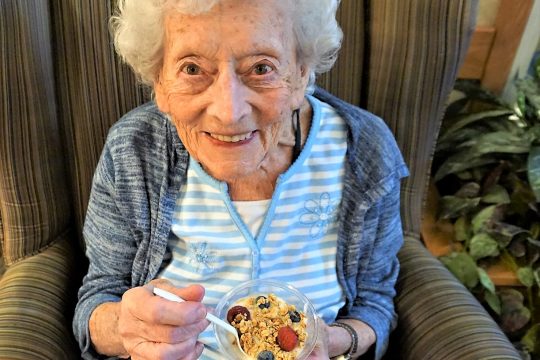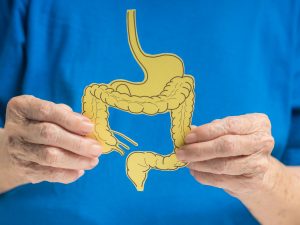
The secret to successful ageing may just lie in your digestive system.
Trillions of microbes — bacteria, viruses, fungi — call your intestinal tract home. These microscopic passengers that accompany us through life help digest food and so much more. They fight harmful pathogens; they affect how well medications work; they influence your immune system and heart health. They also play a role in healthy aging and longevity.
Collectively known as the gut microbiome, here is what you need to know about this complex community of microbes.
What Happens to Gut Bacteria as We Age
As we get older, our bodies start to change — including our ability to digest what we eat. A variety of age-related factors like the medications you take, a sedentary lifestyle, and even tooth decay and gum disease, lead to diminished variety in your gut microbiome.
This reduced diversity in the gastro-intestinal tract (gut) of elderly adults translates into shifts in the dominant species and a decline in beneficial microorganisms.
The Importance of a Healthy Gut to Healthy Aging
In a study published on Feb. 18, 2021, by Nature Metabolism, scientists observed that changes in the composition of your gut microbiome can impact how you age. A gut microbiome that continually transforms as you get older is a sign of healthy aging. It means that your system’s passengers are adjusting appropriately the maturing body.
People who had the most changes in their microbial compositions tended to have better health and longer life spans. They had higher vitamin D levels and lower levels “bad” cholesterol. They needed fewer medications and they had better physical health, with faster walking speeds, and greater mobility. The greater the change, the healthier the individual.
The Second Brain
 Experts in gut health often cite the “gut-brain connection”. Comprised of 100 million neurons, the network of nerve cells lining the digestive tract is so extensive that it has earned the nickname “the second brain.” You can read more about it here.
Experts in gut health often cite the “gut-brain connection”. Comprised of 100 million neurons, the network of nerve cells lining the digestive tract is so extensive that it has earned the nickname “the second brain.” You can read more about it here.
While we don’t know everything about their relationship, we do know that brain health and the gut are intimately connected. This is because your brain and gut actually talk to each other.
A reduction in gut microbiota diversity and disturbances in its composition affects the messages that are exchanged along the gut-brain axis. There is accumulating evidence that these gastrointestinal changes are associated with several age-related neurological conditions, including depression, Alzheimer’s disease, and Parkinson’s disease.
For example, recent research conducted through the Center for Comprehensive Care and Research on Memory Disorders suggests that those who have been diagnosed with dementia have a vastly different population of bacteria in their gut compared to those who have never been diagnosed.
How To Improve Digestion and the Gut Microbiome
Here are 4 strategies to help you host good gut organisms, improve digestion as you age, keep your digestive tract on track, and support healthy aging.
1. Eat your way to a healthy gut
 Mom was right – you are what you eat! Researchers recently found that what people ate had a more powerful impact on the makeup of their microbiomes than their genes.
Mom was right – you are what you eat! Researchers recently found that what people ate had a more powerful impact on the makeup of their microbiomes than their genes.
They also discovered that a diet rich in minimally processed foods like vegetables, fruits, leafy greens, nuts, and eggs results in a more favorable microbiome.
Around since the 1950s, we now know that following a Mediterranean Diet results in: better bacterial diversity; an increase in the types of bacteria shown to reduce frailty and improve brain function; and a reduction of chemicals in the gut associated with harmful inflammation.
Eating a diet high in vegetables provide the fiber needed to build good bacteria. In general, choosing whole foods over processed foods will promote healthy digestion. Processed foods often contain added sugar, fat, and salt that feed “bad bacteria”.
For those looking to heal their gut, the best foods are fermented. According to Stanford School of Medicine researchers, eating fermented foods every day boosts microbiome diversity and improves immune responses. Think, sauerkraut, kimchi, kombucha, miso, and yogurt or kefir.
2. Stock up on prebiotics and probiotics
Prebiotics are essentially carbs that your body can’t digest. These ferment in the gut and feed the good bacteria. Prebiotics naturally occur in many foods, such as legumes, bananas, tomatoes, certain nuts, seeds, and grains.
Probiotics can improve digestive health and may help treat gastrointestinal problems, including irritable bowel syndrome and chronic constipation.
3. Regular exercise promotes better gut health
There’s a lot going on when we exercise. So much that a team of researchers at the University of Utah in Salt Lake City, decided to delve into whether exercise benefits our microbiome. They found that exercising causes important changes that help good gut microbes to bloom.
In another study, people who exercised three times a week for six weeks showed an increase in beneficial gut microbes and a decrease in harmful ones. Participants who continued exercising maintained the gains, while those who became sedentary reverted to less bacterial diversity.
If you are looking for fun and safe ways that older adults can increase physical activity, check out this list.
4. Manage stress to restore gut health
Humans seem to intuitively know that gut health and stress are linked. How often have you said, I have “a gut feeling” or “butterflies in the stomach”? We know that gastrointestinal (GI) problems can create anxiety and stress. And vice-versa.
A variety of stressors can negatively affect gut health, including:
- psychological stress
- environmental stress, such as extreme heat, cold, or noise
- sleep deprivation
- disruption of the circadian rhythm.
To ease the impact of stress and restore gut health, try deep breathing, mindfulness, meditation, better sleep, and practices such as yoga and tai chi.
Enjoy A Healthy Lifestyle in Retirement Living
 All Seniors Care takes gut health, and overall health, seriously. That’s why one of our priorities is to offer delicious foods prepared by Red Seal chefs. With meal plans designed with the help of our dieticians, meals are delicious and packed full of nutrients – think of them as “super plates”!
All Seniors Care takes gut health, and overall health, seriously. That’s why one of our priorities is to offer delicious foods prepared by Red Seal chefs. With meal plans designed with the help of our dieticians, meals are delicious and packed full of nutrients – think of them as “super plates”!
Every day offers residents a new chance to pursue a healthier lifestyle. If you’d like to learn more about life in our Stratford retirement apartments or the newly opened senior living community in Kingston, contact us today or book a tour.
Writer – Julianna McLeod
Julianna is a health and wellness expert at All Seniors Care. Her mission is to create content that empowers seniors to form sustainable solutions for lasting health and happiness. She is an experienced writer, editor, and Recreational Therapist living in Toronto.